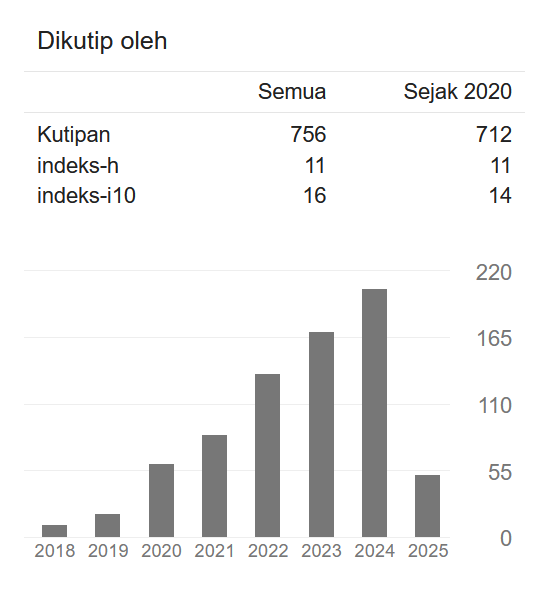Implementation of Humanism Learning in Learning Islamic Religious Education in the Modern Era
DOI:
https://doi.org/10.19109/medinate.v20i1.23048Keywords:
Humanism,, Islamic Religious Education, , LearningAbstract
The purpose of writing this work is to analyze the challenges of the modern era for Islamic religious learning and the implementation of humanism learning. Literature review as an effective approach in collecting, analyzing, and synthesizing information related to the implementation of humanism learning in Islamic religious education in the modern era. With systematic steps, this research allows the identification of relevant humanism principles, strategies, benefits, and challenges. The results of this literature review research provide a deep understanding and an important contribution to the development of Islamic religious education following the demands of the times. This method also offers a strong theoretical foundation for understanding the relationship between humanism and Islamic education. The result of this research is that Islamic learning in the modern era is faced with complex challenges such as the integration of technology with religious values and contextual understanding in a multicultural environment. Solutions that can be applied include developing an online learning platform that pays attention to religious values and prioritizes inclusive interfaith understanding. Strengthening the religious-based character of education and integrating Islamic religious studies with other subjects in an interdisciplinary attitude is also important in answering this challenge. The implementation of humanism learning can form inclusive, empowered, and noble generation learning in Islamic religious education, but challenges such as the integration of humanist values with religious teachings and improving the quality of education need to be overcome to succeed.
References
Amirudin, N. (n.d.). PROCEEDINGS OF THE 2019 NATIONAL SEMINAR ON THE PROBLEMS OF LEARNING ISLAMIC RELIGIOUS EDUCATION IN THE DIGITAL ERA.
Andre, D. (2023, April 17). Information Technology Development: Its Impact to Date. Toffeedev.
Arofaturrohman, Y. A., Alqudsi, Z., & Fauziati, E. (2023). The Implementation of the Learning Theory of Humanism in the Learning of Islamic Religious Education: The Perspective of Carl Rogers. TSAQOFAH: Indonesian Journal of Teacher Research, 3(1), 140–147. https://doi.org/10.58578/tsaqofah.v3i1.837
Bakhri, A. (2015). CHALLENGES OF ISLAMIC RELIGIOUS EDUCATION IN MADRASAS IN THE ERA OF GLOBALIZATION. Madaniyah Scientific Journal, 5.
Diana Devi, A. (2021). Implementation of Humanism Learning Theory in the Teaching and Learning Process of Islamic Religious Education. At- Tarbawi, 8(1), 71–84. https://doi.org/10.32505/tarbawi.v13i1.2805
Dinata, F. R. (2021). Humanistic learning in encouraging the development of affection. Journal of Islamic Education, 7 No. 1, 48–57.
Hidayat, N. (2015). THE ROLE AND CHALLENGES OF ISLAMIC RELIGIOUS EDUCATION IN THE GLOBAL ERA. Journal of Islamic Religious Education, Vol. XII, No. 1.
Hunaepi. (2023). Humanism-Based Educational Transformation: A Review of Ki Hadjar Dewantara's Thought in the Context of Modern Indonesian Education.
Insani, F. D., Sunan, U., & Yogyakarta, K. (2019). ABRAHAM MASLOW AND CARL ROGERS' HUMANISTIC LEARNING THEORY AND ITS IMPLICATIONS IN ISLAMIC RELIGIOUS EDUCATION LEARNING.
Lailatussa'idah, I., Kambali, K., & Rusydi, R. (2022). The Concept of Religious Humanism as a Paradigm of Islamic Education According to Abdurrahman Mas'ud in the Context of Modern Education. Journal Islamic Pedagogia, 2(2), 63–71. https://doi.org/10.31943/pedagogia.v2i2.79
Maula, A. R. (2021). The Concept of Humanistic Learning and Its Relevance in Islamic Religious Education. Atthulab: Islamic Religion Teaching and Learning Journal, 6(2), 207–221. https://doi.org/10.15575/ath.v6i2.14809
Musyafak, M., & Subhi, M. R. (2023). Islamic Religious Education Learning Strategies in Facing Challenges in the Era of Industrial Revolution 5.0. Asian Journal of Islamic Studies and Da'wah, 1(2), 373–398. https://doi.org/10.58578/ajisd.v1i2.2109
Nafsaka, Z., Kambali, K., Sayudin, S., & Widya Astuti, A. (2023). THE DYNAMICS OF CHARACTER EDUCATION IN THE PERSPECTIVE OF IBN KHALDUN: ANSWERING THE CHALLENGES OF MODERN ISLAMIC EDUCATION. Indonesian Impression Journal, 2(9), 903–914. https://doi.org/10.58344/jii.v2i9.3211
Nasution, H. A., & Suyadi, S. (2020). Learning Humanistic Islamic Religious Education with an Active Learning Approach at SDN Nugopuro Gowok. Journal of Islamic Religious Education, 17(1), 31–42. https://doi.org/10.14421/jpai.2020.171-03
Ni, O., & Perni, N. (n.d.). THE APPLICATION OF HUMANISTIC LEARNING THEORY IN LEARNING. http://ejournal.ihdn.ac.id/index.php/AW
Nurmaida, D. K., Nasrullah, N., & Syarifudin, S. (2022a). Humanism Learning Theory in the Perspective of Islamic Education. Asatiza: Journal of Education, 3(3), 133–143. https://doi.org/10.46963/asatiza.v3i3.755
Nurmaida, D. K., Nasrullah, N., & Syarifudin, S. (2022b). Humanism Learning Theory in the Perspective of Islamic Education. Asatiza: Journal of Education, 3(3), 133–143. https://doi.org/10.46963/asatiza.v3i3.755
Pewangi, M. (2017). CHALLENGES OF ISLAMIC EDUCATION IN THE ERA OF GLOBALIZATION. TARBAWI : Journal of Islamic Religious Education, 1(1), 1–11. https://doi.org/10.26618/jtw.v1i1.347
A. M. S. (2021). Application of Carl Rogers' Humanistic Theory in PAI Learning. Journal of Scientific Education, Vol 5 No 1 June 2021.
Qodir, A. (2017). HUMANISTIC LEARNING THEORY IN IMPROVING STUDENT LEARNING ACHIEVEMENT. Journal of Pedagogical Studies, 04(02).
Ricky, R. Z., & Wiranata, S. (n.d.). CHALLENGES, PROSPECTS AND ROLES OF PESANTREN IN CHARACTER EDUCATION IN THE ERA OF THE INDUSTRIAL REVOLUTION 4.0. http://www.hidayatullah.com/berita/nasional/read/2015/05/28/70566/ary-
Solichin, M. M. (2018). Humanistic Learning Theory and Its Application in Islamic Religious Education: An Analysis of Learning Materials and Methods. In Journal of Islamic Studies (Vol. 5).
Sumantri, B. A., Ahmad, N., Islam, U., Sunan, N., & Yogyakarta, K. (2019). HUMANISTIC LEARNING THEORY AND ITS IMPLICATIONS FOR ISLAMIC RELIGIOUS EDUCATION LEARNING. In Journal of Basic Education (Vol. 3, Issue 2). https://ejournal.stitpn.ac.id/index.php/fondatia
Syamsuar, & Reflianto. (n.d.). EDUCATION AND CHALLENGES OF INFORMATION TECHNOLOGY-BASED LEARNING IN THE ERA OF THE INDUSTRIAL REVOLUTION 4.0.
Utami, E. N. (2020). HUMANISTIC LEARNING THEORY AND ITS IMPLEMENTATION IN ISLAMIC RELIGIOUS EDUCATION LESSONS. Mudarrisuna: Media Studies of Islamic Religious Education, Vol 10, No 4.








